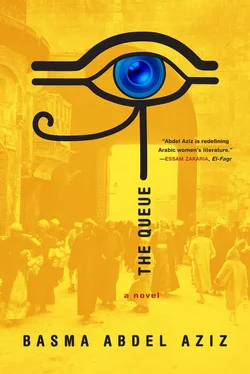He wandered around, thinking about what he should do now. His attempts to comfort Amani were just the first words that had come into his head and then out of his mouth, and he couldn’t even believe them himself. Yehya wasn’t well enough to run away, and he was too stubborn to consider it, much less be bullied into it. In the queue he was constantly surrounded by other people, and he seemed safe enough for now. But once or twice a week he went home to rest and regain some energy, energy he was losing day by day with the grueling effort of staying alive. Winter was looming and soon he wouldn’t be able to stay in the queue day and night as people did now. Yehya’s apartment was no secret, and neither was Nagy’s. The neighbors knew them; neither place would be safe for him. Nagy lost himself in all the complications, his head a torrent of disparate thoughts, and he realized that he’d arrived at the microbus stop without realizing it. He felt fatigue bearing down on him, so he squeezed himself into the first bus that arrived and decided to let himself be taken to wherever the line ended.
He yawned and rested his temple against the window, making circles of condensation with his dewy breath and doodling in them, an old favorite pastime. The streets were empty at this hour. Even all the cats and dogs had vanished, except for a single plump cat, also yawning, on top of a white car covered with a considerable layer of dirt. The sky was faintly lit; thick clouds veiled the rays of the sun, tempering the air, while dusk lay heavy on the horizon. It was the hour when particles of dust and debris seemed suspended in the emptiness, neither falling to earth nor disappearing into space.
The bus passed an arrow-shaped sign with PUBLIC ROADwritten across it in thick letters. It pointed toward a steep ramp veering off to the right of the highway, and, unperturbed, Nagy realized that he was heading up a hill. They were going in the direction of the newspaper headquarters, and it occurred to him that he could try to catch Ehab, who’d raced off to the office with a new investigative report. But for now Nagy savored the sensation of letting his mind drift, and put his thoughts aside. Signs rolled by, one after another, until finally the driver announced the end of the line. He stopped the microbus beneath a giant sign with the phrase REMEMBER GODwritten in thick white letters, above a cell number and signature: Abbas .
He wasn’t far from the newspaper headquarters; he could see it just down the road, and he got off the bus leisurely and headed toward the unassuming building. He figured he should tell Ehab what he’d learned from Amani, but he wasn’t convinced that it was worth seeking him out. Even with this information, what could either of them do? Inside, he inquired about Ehab, and another employee told him he was in a meeting with the editor in chief. Nagy left his name with her and went to wait outside. He sat down on the sidewalk across the street and leaned his head against an old tree trunk, feeling the branches drape themselves around him and the ancient scent of pine fall over him. Maybe it was time for Yehya to stop being so obstinate, even if he felt it was an insult to back down. The situation was dire, and he was no longer the only one implicated; Amani had been drawn into the game as well, which meant it would be hard for things between them to go back to how they were before.
In the years stretching between his studious university days and that afternoon, the two of them were all he knew, his closest friends, despite how different they all were. Amani and Yehya hadn’t been drawn to each other out of an effortless, natural compatibility; they were both strong-willed and stubborn. Amani was headstrong, a trait he hadn’t often seen in women, while Yehya’s tenacity never abandoned him, and he never lost his faith in his ability to turn a situation to his favor. Yehya would never admit that he was just a single, powerless man in a society where rules and restrictions were stronger than everything else, stronger than the ruler himself, stronger than the Booth and even the Gate.
Nagy had failed to convince them that everything in the world was interconnected, and that their lives were ruled by a network of intricate and powerful relations. Even things that seemed random operated according to this invisible system, even if the connections couldn’t be seen. Yehya laughed whenever they discussed it seriously, teasing him that the philosophy department had corrupted his mind and destroyed his faith in human nature. Amani would laugh, too — she could never be convinced that the independence she believed she possessed was in truth no more than an accepted illusion, part of a web of relations and contradictions. The Gate itself was an integral part of the system, too, even if from the outside it appeared to pull all the strings.
One day long ago, he’d told Amani that everything she did, even if seemingly trivial and irrelevant, had reverberations in the grand scheme of things. Even something apparently insignificant — like the amount of air she breathed — could have consequences. He had smiled to himself while assuming an outward solemnity, and added that, for example, the meager rent she paid her landlord could have contributed to the Gate’s sudden appearance in the heart of the city. And conversely, he told her, she was affected by everything that happened, too, even if she didn’t admit it; if the Gate announced a ban on kites with colored streamers, it could indirectly influence her daily life or work. This interrelation was real, even if there were no explicit connections. At the time, she’d laughed and told him he was completely mad.
For as long as he’d known her, she’d never cared for politics or philosophy. No matter what happened, she focused only on the concrete details of everyday life. Yehya was just like her: he would rather deal with tangible reality and the things he knew firsthand. And so Nagy was always the odd one out, the one who paid little attention to life’s minor details and often appeared lost amid it all. He saw only the wider context, the systems that everything was governed by. He wasn’t interested in the little pieces; he wanted to understand the broader picture, how it worked and what it meant. At first he’d envied their safe, secure lives, while he had been battered by the Gate’s tempestuous wrath; but now he was going to lose Yehya, and Amani, too. He would be left alone, powerless and bound to life as it had become, no longer capable of the liberty he’d once enjoyed. If he were still a student, or even a hopeful young lecturer, he would change everything about the queue, defend his friends fearlessly, and persist until he’d brought down the Gate and the whole system with it.
He was roused from his reveries by a friendly smack on the shoulder from Ehab.
“Hey, Nagy, I wasn’t expecting you.”
“I just happened to stop by — you won’t believe what happened this morning.”
“Let’s talk on the way. You’re going to the queue, too, right? Listen, my boss doesn’t want to publish any more reports about the queue. He refused the article I wrote a week ago, and today he turned down another one, and before these two he took everything important out of an article I’d written about my trip to Zephyr Hospital with Amani. Can you believe it, he cut three whole paragraphs down to two and a half lines; it looked like a greeting card when he was done with it! And he even rejected my piece on the Violet Telecom boycott. He threw it down on his desk when he saw the headline, and then refused to give it back to me when I asked him for it. I’m telling you, that man is suspicious, acting all high and mighty — how can he ban an article on the phone-company scandal while allowing an article that attacked Zephyr Hospital, even if it was short and more vague?”
Читать дальше











